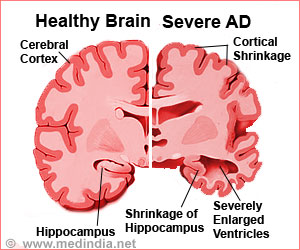Your life can change in the blink of an eye, especially when you have Alzheimer’s. Your conversations with others just go round in circles. You realize that suddenly your goals, dreams and priorities are forced to take different turns. In this disease, the mind dies first; slowly the interior scrapbook of your entire life like names, places, dates and so on, all fade into a mist of non-recognition.
What is Alzheimer’s?
Alzheimer’s disease is an irreversible, progressive brain disorder which gradually destroys your memory and thinking skills, and is devastating in the sense that you eventually even lose the ability to carry out the simplest tasks. Since many years, the medical profession has had the means to reduce and reverse the signs and symptoms of Alzheimer’s.
It is the common cause of dementia, which is basically the loss of cognitive function such as thinking, remembering, reasoning to the extent that it causes major interference in a person’s life and day-to-day activities. Alzheimer’s is a neuro degenerative type of dementia, which starts off mild, but gets progressively worse with time. It is estimated that by 2050, there will be nearly 135 million people globally who would be suffering from dementia. In 2010 alone, the total annual global cost incurred in treatment of dementia was thought to be about $604 billion.
What Causes Alzheimer’s Disease?
Like all types of dementia, Alzheimer's is caused by brain cell death. It is seen that as more and more of the brain cells die, it leads to gradual shrinkage of the brain cells. It results from a combination of genetic, lifestyle and environmental factors that affect the brain over time.
Scientists believe that the collection of plaques of beta-amyloid protein, which causes damage to the brain cells, is the main cause of the disease.
In the brain, transport of nutrients and other essential materials requires the normal structure and functioning of a protein called tau. However, in Alzheimer’s disease, this protein is reported to twist into abnormal tangles in the brain which leads to failure of the transport system and eventually the death of the brain cells.
New Blood Test to Detect Alzheimer’s
According to the scientists, the reason for yielding poor test results in drug trials of patients with Alzheimer’s disease is because medications are administered quite late in the development of the disease.
Mild cognitive impairment or MCI could be an early sign of dementia, which includes problems with day-to-day memory, attention and language. It is estimated that nearly 10% of people with MCI go on to develop dementia within a year of getting it. There is currently no reliable way of predicting MCI in individuals.
In the first analysis of 26 proteins in the blood samples, it was found that 16 of them linked strongly to brain shrinkage in the MCI and Alzheimer's groups.
In the second analysis, the researchers discovered a combination of 10 proteins which could predict whether individuals would progress from MCI to Alzheimer's disease within a year with an accuracy rating of nearly 87%.
Dr. Abdul Hye of King's Institute of Psychiatry, who was also the lead author, said that the study marks the end of many years' work to find which of the thousands of proteins in the blood were clinically relevant.
He also commented, "We now have a set of 10 proteins that can predict whether someone with early symptoms of memory loss, or mild cognitive impairment, will develop Alzheimer's disease within a year, with a high level of accuracy."
Simon Lovestone, who is a senior author and a professor at the University of Oxford explained that Alzheimer's starts to affect the brain years before patients can expect to receive a diagnosis. He added “Although we are making drugs they are all failing, but if we could treat people earlier it may be that the drugs are effective. Alzheimer’s begins to affect the brain many years before patients are diagnosed with the disease. If we could treat the disease in that phase we would in effect have a preventative strategy.”
Till these tests are further validated, remember that those with Alzheimer’s are still people and they still have stories and character, they are all individuals and are all unique. They just need to be interacted on a human level. They say that there is no substitute for the love of an Alzheimer’s caregiver And to care for those who once cared for us is undoubtedly one of the highest honors!!!!














